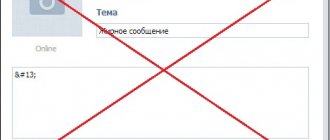For many, the social network VKontakte has become the place where the user (of course, not everyone) spends almost all of his free time. Hence, it is not surprising that the site developers have introduced the ability to give their friends virtual gifts, which, of course, cost a certain amount of money. Users liked this idea so much that thousands of people confess their love to their significant other in this way, congratulate their friends on their birthday and simply give each other a sea of positive emotions.
And almost from the first days of this innovation, VK users began to wonder: how to send a gift to yourself in VK and is it even possible?
Ways to send a gift to yourself
VK developers have never introduced a function that allows you to send a gift to yourself, but those who especially want to achieve their goal still came up with several working methods.
The first was to go to someone’s page, click on “Send a gift” and after selecting it, select another recipient - yourself, and delete the first one. To do this, you had to enter your id in the recipient field and click send.
Unfortunately, as you can see from the screenshot, this method is not currently available.
The second method of giving a gift to yourself was even easier. It was necessary to go to the privacy settings and select a function that allows you to find out what your page looks like through the eyes of another user, and then everything is the same as in the usual version: click “Send a gift” and give it to yourself.
To another disappointment, this “shop” was also closed.
But time passes, and the need to send gifts to yourself remains. And now we will talk about some of the “Narcissism” methods currently in use.
I'm more than sure that many VK users wanted to give a gift to themselves, but they didn't succeed because they didn't include themselves in the list of recipients. I provide you with detailed instructions on how to still send a gift to yourself.
To send a gift to yourself, you need: First of all, you need to follow this link: https://vk.com/gifts.php?to=X Instead of X, enter your ID (example: https://vk.com/gifts .php?to=124346444 ).
After you have entered your ID instead of X, you can check who the recipient of the gift is. Just scroll down the page and if you see your data, then everything went as it should. If you changed your ID to an alphabetic one and don’t remember it, then you can always look it up in “My Settings” (example below). That's all.
Disclaimer: The author or publisher has not published this article for malicious purposes. All information posted was taken from open sources and is presented for informational purposes only and does not contain a call to action. Created for educational and entertainment purposes only. All information is aimed at protecting readers from illegal actions. The visitor assumes all possible damages caused. The author performs all actions only on his own equipment and on his own network. Don't repeat anything you read in real life. | Also, if you are the copyright holder of the material posted on the pages of the portal, please write to us via the contact form with a complaint about the deletion of a certain page, and also read the instructions for copyright holders of materials. Thanks for understanding.
- Facts about proxies
A proxy server is an intermediate link (computer) that mediates… - About stalkerware and spyware: or legal applications for spying on someone else's smartphone
Do you have doubts about the fidelity of a girl or guy? Do you want to know what... - How to set up file transfer between Ubuntu and Windows
Copying data from a Windows PC to Linux - or... - Open Source Car Control – control your car using a computer
OSCC allows developers to send control commands to the vehicle, read messages... - Wrong PIN Shutdown - shutdown when entering the wrong PIN code
If you ever lose your smartphone or get stolen, you... - How to add a lot of photos on VKontakte using PHP
Cheating on VKontakte pages has become a very popular topic recently... - How to check and clean your smartphone for spyware
You may have information that someone else wants to get their hands on... - About data exfiltration via DNS
Two thirds of information leaks do not occur due to malicious intent... - Kali: how to create a DLL virus using Linux? Can a DLL file be a virus?
Let's create a few of our own viruses, which I do not recommend checking... - About local resolv DNS in Linux
Setting up network interaction of services is not the easiest task and often... - WiFi ESP8266 Deauther can crash the network, create fake points, block access
Wi-Fi jammer, or Wi-Fi jammer, is a gadget that is designed... - Virus in CHM file
Hey everyone! The purpose of this article is to show the insecurity of the chm format, and ... - Windows Spy Blocker: software to disable spying and surveillance in Windows 10
WSB is an application written in Go and delivered as a single... - How mobile operators can deceive their subscribers
There are four large mobile operators in Russia, which are in pursuit of... - Sharik: OpenSource solution for sharing files via Wi-Fi and Mobile Hotspot
No Internet connection required. Completely free and does not contain… - How to search and hack Lite Windows IoT devices and Omni walkthrough
Global computerization of everything and everywhere gives us amazing opportunities for easy... - How to protect your website from hacking and hacker scripts
Thousands of websites and web services are hacked every day. Home… - How programs were originally written without programming software
In short, new programming languages and other tools are being created... - Scheme for selling a dummy apartment
Apartment fraud seems to be invincible. In the age of information, when for everyone... - XSSTRON – Chromium-based browser for XSS searching
Just browse sites like you would in a regular web browser, and then it...
First way
First, you need to find out the id of your page. To do this, go to settings and, remaining on the general tab, find “Page Address” and click change. The numbers below will be your id.
Now you need to open the menu with gifts and select the one you are interested in. After that, right-click on it and select “Inspect Page Element”.
The number between /gift and /256 is the gift id.
Now all you have to do is edit one link a little:
https://m.vk.com/giftsG?act=send§ion=trending&gift=R
Instead of “G”, insert the id of your page, and instead of “R”, insert the id of the gift. Next, copy the edited link and paste it into the address bar, then press enter.
Why is it important to learn to give yourself gifts?
“We often confuse this skill of a good, healthy attitude towards ourselves with selfishness. It seems to us that spending money on ourselves is shameful, bad, that “you can’t think only about yourself,” etc. On the other hand, we expect gifts from other people, as if trying to shift responsibility for our positive emotions and sense of self-worth onto them,” comments Alisa Galatz.
As the expert notes, the ability to pamper yourself, to give yourself something pleasant and valuable is an important skill that helps us be our own resource - support, help, bring joy. According to the expert, this skill is based on acceptance and understanding of oneself, awareness of one’s needs and the ability to satisfy them. “In fact, the ability to give yourself gifts is a sign of personal maturity, a kind of ability to be your own inner parent,” explains the specialist. But the absence of this ability, according to the expert, often leads to the fact that we develop a dependent style of relationships with others, a victim complex or, conversely, an eternal “savior” who forgets about himself for the sake of others.
What to give yourself for your birthday if you are a woman
Who are we? - Women! What do we want? - We don’t know! When do we want it? - Now! Jokes aside, but what to do if we don’t even know what to order for our man or mother. And here you have to please yourself. Not easy.
But that's just how it seems.
In fact, as soon as you sit down and start making a wish list, you will have such a gift appetite that dear mother. And, of course, in the first place on the list of desired things will be something very cute and pleasant. What I always wanted, but never got around to buying.
Jewelry box made of genuine leather
You can look at this accessory forever. And it also takes a long time to lay out your rings, earrings, chains and other jewelry, carefully presented by your beloved man. And until you buy such luxury for yourself, you don’t understand how cool it is to own such an expensive and exquisite item. So treat yourself to a jewelry box. Let it be a hint of what you need to give in the future.
Umbrella with transparent dome
One special accessory – a cane with a transparent dome – will allow you to create a beautiful autumn photo shoot, not allow bad weather to ruin your mood, and let a dull umbrella create a carefully created image. If you don't have one yet, be sure to order it. This thing gives a sea of unusual sensations and perfectly protects from the vagaries of nature.
Set of cooling glasses
If you have been missing stylish glasses for delicious parties for a long time, order a Freeze set for your birthday. The set includes two transparent glasses with silicone rings, the walls of which are filled with cooling gel. Parties are parties, and in the summer you will simply fall in love with them.
Tabletop biofireplace
Do you love comfort, warmth and coziness, but for this you sorely lack a fireplace with a real, living flame? Birthday is the time to fix the situation! Moreover, you don’t need to hire workers, break down half a wall or stock up on coals. The stylish tabletop biofireplace Calm, running on environmentally friendly fuel, will allow you to create a special atmosphere in any room and truly enjoy the dance of small, living lights.
Singing toy
It doesn't matter how old you are. When you buy a gift for yourself, you don’t have to justify to anyone that you’ve long wanted an unusual soft toy or pet. You just ordered a cute singing puppy and you’re happy. Every day you rejoice because he is mega cute.
Blanket with sleeves
Did you see a cool plaid with huge sleeves on a friend’s and wanted one for yourself? Here he is! Soft, warm, lightweight and incredibly comfortable. Order and enjoy every minute spent in his arms!
Branded scarf made of natural silk
How to add a bright twist to your everyday look without changing anything significantly? Give yourself a branded scarf made of natural silk. The Pomezia model from Ungaro simply knocks you off your feet with the richness of its colors and the number of unrealistically beautiful shades. But at the same time, the scarf looks very expensive, elegant and airy. How you managed without it before is not clear.
How to see sent, hidden gifts in VK - an easy way
If a person has many friends and subscribers on VK, he often does not understand how to find out who he gave a gift to in VK. After all, it is very easy to forget or confuse. And sending the same gift to the same person is not very nice. A friend may be offended, especially if the friend is female . For some reason, girls pay a lot of attention to such things.
Download BroBot for free
In the old version of VK there was a special “sent gifts” tab, but it has now been removed for security reasons.
Gift to yourself
Gift Academy > Scientific gift studies > Sociology of giftprintable version add to favorites
It has long been customary to give gifts to your relatives, friends, and acquaintances. This phenomenon of giving is well studied in every culture. There is a lot of literature about when, to whom, what and how to give. There are debates about appropriate and inappropriate gifts, and a search for a universal gift is underway. At the same time, the phenomenon of giving a gift to oneself has been completely neglected. But how often do we pamper ourselves with all sorts of trinkets! Why does this happen when we give ourselves gifts? What is this? A cry of desperate loneliness or a reward after trials. This is what we had to find out during the study.
As part of this work, 30 people (15 women and 15 men) were interviewed (focused interviews) in January 2001 in Moscow. The purpose of the study was:
1. clarification of the conceptual apparatus,
2. consideration of the reasons for giving oneself gifts,
3. analysis of gifts.
First, let's try to figure out what a gift to yourself is. The concept of a gift is subjective, since it depends on the understanding of this phenomenon by the subject (the person giving the gift) and the object (the person to whom the gift is intended). In the case where the gift is given to oneself, it is the same person. The main functions of such a gift are to bring pleasure, increase life satisfaction, and evoke a feeling of happiness.
The entire donation process can be viewed from four angles:
1. Participants in the donation – the giver, the gifted (in this case this is one and the same person) and witnesses of consumption. Witnesses of consumption are everyone who, wittingly or unwittingly, observes and reads the text that we “write,” gifting ourselves. For example, “Vladimir Bryntsalov, a famous Russian rich man and presidential candidate (1996), told how he was once walking down the street and was angry that no one knew how rich he was. Then he went into the store and bought an expensive leather belt. And, he says, he felt better” [3]. When a person gives himself a gift, he always strives to convey to others some information about himself, perhaps without realizing it. A person can buy something tasty for himself and eat it right away, then the seller and people nearby in the store will act as witnesses of consumption, etc.
2. Gift. Based on the presence or absence of a preparatory stage, gifts are divided into:
- rational: a person spends material or time resources to receive and use a gift. This is some “long awaited thing”. In the respondents’ answers it sounded like this: “You can walk around things for a long time, and then buy them with pleasure. It doesn’t have to be specific to the situation. I liked the thing or wanted it for a long time,” “... I wanted it for a long time... I saved money.”
— spontaneous: a gift is bought without a preliminary stage of thinking or pricing. “I was walking down the street... I saw... I liked it... I bought it.”
Gifts can also be divided into tangible and intangible. Any thing can act as a material gift. Intangible gifts may include information or services. In the respondents’ answers it sounded like this: “...I gave myself a trip to a beauty salon.” As a special category characteristic of the type of gift under study - “doing nothing.” In the respondents' answers it sounded like this:
“...slept on Friday, Saturday, Sunday” or “a real gift to yourself is to allow yourself to do nothing all day, relax, watch TV, etc.”, “if I manage to do something quickly, I give myself a gift “The rest of the time I read, I lie on the bed.”
3. The result of the donation. The result is understood as a certain emotional state of a person that arose after purchasing a gift or at the moment of self-gifting.
So, let's look at what people understand by the concept of “a gift to yourself.” Indicators that this item or service is a gift may include:
(A) Going beyond your own daily budget. The product or service being consumed is not an item of everyday consumption. That is, buying sausage is a gift only if it is not included in “everyday consumption” goods and has long been desired.
In the respondents’ answers it sounds like this: “I buy this thing because it is of high quality and comfortable,” often it also turns out to be expensive and belongs to things of a higher social class. This can be explained by the fact that things that correspond to a person’s lifestyle are consumed by him in everyday life and are not regarded by him as a gift. Those. Buying a gift for yourself is always a matter of conspicuous consumption. “Burn everything with a blue flame, I’ll buy it.” The term “conspicuous consumption” or “demonstrative consumption” was first coined by T. Veblen and meant “the use of consumption to prove the possession of wealth”, consumption “as a means of maintaining reputation”[1]. This is consumption, which is carried out largely for its reading and decoding by others. The content of this text is simple: “I am rich. I'm a respectable person. I am successful."
(B) Change in emotional state. A gift always brings joy, otherwise people do not regard it as a gift. A difference was revealed in the answers of men and women. Women mainly emphasize the entertainment nature of the gift. They give themselves a gift when they are sad, depressed, etc.: “As much money as I can spend on my family, I’ll finally spend it on myself.” That is, the main goal of the gift is to create a good mood, at least for a few minutes. A gift to yourself is often a salvation from loneliness. “Who will give it to me if not myself”, “a gift to yourself is a joy that you cannot receive from others and is forced to give to yourself”, “A forced gift to yourself, to a certain extent it serves as an indicator of loneliness.”
Men, on the other hand, are more likely to evaluate a gift to themselves as gratitude, payment for their work:
“One of the situations is that I gave myself a modem for my birthday. Well, I really wanted to get on the Internet, and just mess around with my friends via modem. It was winter, on the day when I took the exam... Before entering the classroom, I decided that if I passed the exam well, I would buy myself a modem.”
“When you want to satisfy some of your urgent needs, you strive to do something nice for yourself, perhaps as a reward for something. For example, if you passed an exam, you need to encourage yourself and buy something.”
“Most often, this is a reward for overcoming some difficulties that are not obvious to others (otherwise they, people from the outside, would congratulate you).”
Often, a “gift to yourself” means a thing or service that a person wants to receive, but for some reason he cannot tell others about his desire.
In the respondents’ answers it sounded like this: “The thing I want, but I won’t ask anyone to buy it.”
“I want to have some thing, and the holidays at which this gift could be given to me are far away.”
“A gift to myself is something that, in my opinion, no one can buy for me, because I’m unlikely to tell anyone about it. This is the kind of thing that I would like to have, but since no one will guess that I need it, I will have to buy it myself.”
“A gift to yourself is a necessary thing that the family does not know is necessary.”
A gift to yourself is an exclusive, expensive thing or service that a person wants to receive, but the gift of which would impose financial, time, etc. on the giver. difficulties.
“I want a Guzzi watch, but it’s expensive, it’s unlikely that anyone will buy it for me except myself.”
Such a gift can be an item you liked and immediately purchased or; “I just wanted to wish myself a Happy New Year, so I went in and bought myself whatever I wanted.”
Summarizing all the available answers, we can say that a gift to oneself comes down to a break in everyday life and, as a consequence, to the awareness of the fact of giving by the recipient and the giver (here this is one person). A gift to yourself always has a meaning, and since it is not one of the items of everyday consumption, it is an object of demonstrating oneself to others. Consequently, a gift to oneself acts as a form of building one’s identity “I am what I have and consume.”
A gift to yourself is something that a person especially needs. “The last three gifts to myself: I drove a car alone (I really like to drive around the city alone, but I rarely manage to do this); “I bought trousers and a blouse.” By gifts to oneself one can judge a person’s value orientations, his passions, secret desires, etc.
A gift to yourself acts as an attempt to design your own lifestyle. A person gets “extra” money in one way or another. He satisfies all natural needs, and he wants recognition, the envy of others, and respect. This is driven by the eternal passion of people for competition, for achieving victory in the game, a variation of which is a gift to oneself. As I already said, a gift to yourself is always an object of conspicuous consumption. In this case, the main purpose of a gift to yourself is to convey information to others about your social status.
It could be anything: from a delicious cake bought in an expensive restaurant to a luxury car. Basically, respondents give themselves cosmetics, perfumes, clothes, shoes, toys, etc.
A gift always carries with it a symbolic load. This text is shaped by the society in which a person lives. The media and, in particular, advertising play a huge role in the replication of signs. “Advertising moved from information to suggestion, then to imperceptible suggestion, but now its goal is to manage consumption” [4, p.136]. If I buy an object, the invisible but felt field around this object is of great importance to me. It’s as if I see this object through the image that was formed in my head before. So for many, a white dove is associated with peace, a red rose with love, etc.
The purpose of advertising is not so much to promote the sale of a particular product or service, but to introduce into the public consciousness the image of an entire society consuming this service. As for advertising gifts to oneself, its role may be the greatest because the consumer is led to believe that this product (service) meets his desires. For example, an advertisement for women's deodorant Jovial: “This is not for him... and not for him... and not even for Him... This is for YOU.” Or an advertisement for perfume: “Feel like a WOMAN...”, an advertisement for chocolate “Feint”: “... For those who are truly cool,” Loreal cosmetics: “After all, I deserve it...”, etc. Or male symbols: “A real man “deserves” to drive the best car”, “Gillette - there is no better thing for a man”, etc. It is this image, and not the real product (service), that is circulated on the market. The simulation of a product (service) in an advertising message begins to prevail over the service itself. Moreover, the emphasis in the advertising message is not on the quality characteristics of the product, but on the additional conveniences with which this consumption is associated. Thus, women more often pay attention to the tone of the advertising message, femininity, and attractiveness. Men pay attention to reliability, comfort, prestige.
“The individual is sensitive to hidden motives of security and to the care with which “others” convince and persuade him, to the elusive sign of consciousness that somewhere there is a certain authority (in this case social, but directly referring to the image of the mother), which undertakes to inform him of his own opinions, anticipating and rationally justifying them in his own eyes.” [4, p.138]. Thus, in the eyes of the consumer, a harmonious image of a product is created, oriented towards a higher goal - to provide satisfaction to the consumer of these services. Therefore, it is natural to gift yourself with self-care in the form of a product or service.
We can say that a person, buying its image along with an object, buys some other important energy for himself - joy from the purchase, an increase in strength - all this is part of the product, a certain value prepared, among other things, by advertising. In other words, you bought our wonderful cigarettes and became a cowboy, you bought our watches - and you are a successful businessman, etc.
Some respondents note that, having received a long-awaited gift, they realized that they, in principle, did not need this thing, they could easily do without it. Why do such situations arise? Here there is a discrepancy between the real product and the ideal one, i.e. image of a particular product. In the course of daily practices, based on one’s own experience or the experience of others, a person brings the existing myth about a product into line with the product itself. But sometimes, due to financial, temporary, sociocultural or other reasons, such a correspondence does not occur.
Sometimes we also remain dissatisfied with a gift given to ourselves because of the inadequate reaction of “witnesses of consumption” to it. So, for example, one of the answers was this: “A case of an unsuccessful gift to myself: one morning I looked at myself in the mirror and decided to change something about myself. I bought myself a blouse. My friends didn't like her..."
A difference was found in the responses of married and unmarried people. Those who are not married more often give themselves various kinds of gifts, while family ties involve spending money on the family. Some respondents understand a gift to oneself as a gift for a loved one. Often a gift to yourself refers to gifts from “family”.
To the question: “What is more pleasant for you, giving to yourself or receiving gifts from someone else?” The answers were divided, some answered that it is more pleasant to give, because you feel more joy, and sometimes gifts to yourself are forgotten faster: “You buy yourself all sorts of sweets, you fill yourself up... you’re satisfied, and after 5 minutes you want it again. And when you give it to someone else, it’s nice that you did something good for them, and your soul immediately becomes joyful.” Others, on the contrary, said that it was more pleasant for them to give gifts to themselves, justifying their answer by the usefulness of the gift for themselves: “it’s more pleasant to give to myself, because I know exactly what I need and what I will do with it.”
To the projective question about the possibility of giving the desired gift to someone else, the following answers were received: some do not reject this possibility: “it is customary to give gifts on some holiday, but gifts to oneself are not such”, “close relatives could... but I’d rather myself".
And yet, let’s return to the question of why people give themselves gifts. Every action performed by a person, every act of his, has its own motivational grounds, its own motives. Let's try to find out why or for what purpose a person gives himself gifts.
In the literature on psychology, sociology and advertising, human behavior is often explained through the so-called pyramid or hierarchy of needs of Abraham Maslow. The desire to give oneself a gift arises when and only when a person’s basic needs are satisfied. Then he strives to satisfy the needs for respect and approval from others. Intermediate are the needs for safety, security, the need to be treated well, to be loved, to belong to a group. Needs are satisfied in the order in which they are presented in the pyramid - from lowest to highest. Higher-order needs cannot manifest until lower ones are satisfied.
A gift to yourself serves to satisfy the need for self-esteem. Self-esteem, in turn, involves satisfying the needs for competence, confidence, independence and freedom. In other words, it is important for a person to know that he is a worthy person. It also involves satisfying the need for self-respect by others, which manifests itself in the need for prestige, recognition, reputation, status, evaluation and acceptance. In other words, a person needs to know that everything he does is recognized and appreciated by others. Failure to satisfy the need for self-esteem leads to feelings of inferiority, weakness, dependence, and passivity. This explains the large number of responses that focus on dissatisfaction, which prompts them to buy something for themselves. In the respondents' answers this sounds like: “I was lonely”, “when I was sad”, etc.
The word “self-respect” in everyday speech, and partly in scientific literature, implies self-satisfaction, and self-acceptance, and consciousness of one’s own worth, and a positive attitude towards oneself, and the consistency of one’s actual and ideal “I”. High self-esteem is not synonymous with conceit, arrogance, or lack of self-criticism. A person with high self-esteem does not consider himself better than others, but simply believes in himself and that he can overcome his shortcomings. Low self-esteem, on the contrary, implies a feeling of inferiority, inferiority, unworthiness, which has a negative impact on the mental well-being and social behavior of the individual.
People with high self-esteem are significantly more satisfied with their lives. Low self-esteem is one of the characteristic companions of depression, the experience of “misfortune”, and loneliness. Therefore, it is very important to give yourself gifts and maintain your self-esteem at the proper level.
A gift to yourself is “some excess.” It is not dictated by physiological necessity. Therefore, you can talk about a gift to yourself only when funds appear above the consumer basket. By giving himself a gift, a person identifies himself with the referent, fulfills his need for recognition, respect from others, etc. In the end, he learns to respect himself, which, in turn, helps him further organize his activities. You cannot consider gifts to yourself only as a means of increasing self-esteem; you must also remember about its demonstrative nature. After all, it is he who often determines the subject of the gift.
Will there come a time when we will no longer be lonely, and all our desires will be understood by others and fully satisfied? Will there come a time when it will no longer be so important how and what you consume? I will conclude the work with the statement of one of the respondents: “This is unlikely to ever happen. If only because there is no person who would understand me as I understand myself.”
Literature:
1. Veblen T. Theory of the leisure class. M., 1984.
2. Ilyin V.I. Consumer behavior, Syktyvkar, 1998.
3. Ushakin S. Quantity of style: consumption in conditions of symbolic deficit. URL https://www.nsu.ru/psych/internet/bits/ushak011.htm
4. Baudrillard J. System of things. M.: Rudomino 1995.
Egorova Maria
(Tomsk University). A gift to yourself. Sociological essay. Published on the website www.socnet.ru Special seminar “Sociology of the gift”. Center for Sociological Education of the Institute of Sociology of the Russian Academy of Sciences. Moscow, 2001.
So how can I see sent gifts in VK now?
- If you periodically have to remember what gifts you gave and to whom, we do not recommend that you clear your correspondence history for at least a year.
- Go into a dialogue with the user to whom you are going to send a gift, scroll back and see if you have already given him the same gift before. All gifts are displayed in correspondence, including hidden ones.
How can I view sent gifts on VK if they are not hidden and the message history has been deleted?
Usually, doubts arise only among a relatively small number of people. To see if you gave exactly the same gift to your girlfriend for her last birthday, you need to:
- Go to her page.
- There, right under the photo and the list of friends you will see the inscription “gifts”.
Window title with a complete list of gifts
It is useful to view all the gifts of the person you are interested in, even if you sent the gift, hiding your name from strangers. When you see your gift with a hidden name in the general list of gifts, you will most likely remember that it was you who gave it.
This method can become too tedious if you are interested in not just one person, or a small group of friends, but more than a dozen. In this case, page verification may take too long. In addition, some people generally hide all their gifts.











